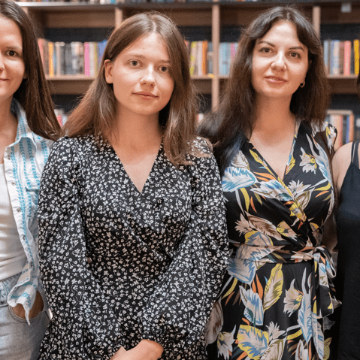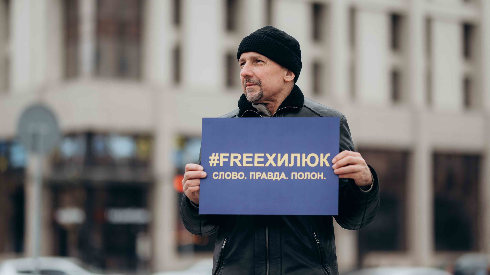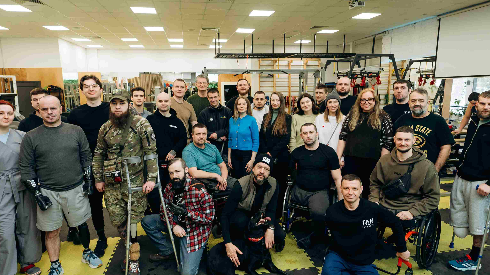
“Degradation. Torture. Degradation.” A poetical video project in Kyiv talks about Russian captivity
On August 30, 2024, the International Day of the Disappeared, an evening of poetry was organized in support of the “Hold on! Holding on!”
The event gathered human rights defenders, artists, and relatives of those currently held in Russian captivity. During the evening, poems written by those in captivity were shared, along with works about imprisonment. The discussions emphasized the importance of writing and speaking out about these issues. The event was organized by the Center for Civil Liberties, a human rights organization awarded the Nobel Peace Prize, in collaboration with the Kateryna Osadcha Foundation.
According to data from the Center for Civil Liberties, it is estimated that at least 7,000 civilians are being held in Russian jails, including in occupied territories. The number of military prisoners of war (POWs) remains unknown. Both civilians and POWs are subjected to severe violations of international law, enduring isolation and being placed in an informational vacuum. This is why it is crucial for us to be their voice while we can. The poetic project “Hold on! Holding on!” was created to shed light on the suffering and resilience of Ukrainians enduring Russian captivity.
Among the event's participants were, but not limited to: Ahtem Seytablayev, currently serving in the military, actor, and film director; actor Roman Yasinovskyi; poets Tetyana Vlasova,Iya Kiva, and Tonia Kornuta; Olena Zygipa, wife of the captive Sergiy Zygipa; and Oksana Stomina, wife of another prisoner of war. The event was moderated by Oleksandra Romantsova, director of the Center for Civil Liberties.
That evening, short films were presented featuring talented actors Irma Vitovska, Daryna Tregubova, Ryma Zyubina, Ahtem Seytablayev, and Roman Yasinovskiy, who recited poems by Ukrainian authors about captivity. These films were created as part of the “Hold on! Holding on!” campaign and were filmed at the Kyiv pretrial detention center, one of the oldest in Ukraine. Notably, this center once held prominent figures such as Sergiy Paradzhanov and Maksym Rylsky. The filming was supported by the authors themselves, as well as Oleksandra Matviychuk, head of the Center for Civil Liberties, and Nariman Dzhelyal, who was recently liberated from Russian captivity.
“We cried during the filming, we cried during the editing, and we cried again when we saw the final result. It was incredibly important for us to create this now, in the midst of the current wave of informational intoxication, to bring this topic to light through the lens of suffering and emotion,” remarked Anna Trushova, the director of the short films and communication manager at the Center for Civil Liberties.
During the event, poet Oksana Stomina, wife of a prisoner of war, shared her thoughts. Her husband, along with other defenders, was detained in May 2022 after being besieged in Mariupol’s Azovstal steel plant—the last stronghold of the city. She emphasized, "It is crucial that this issue is not left solely to the affected individuals and the families of the imprisoned. This is a problem for all of us, and it’s vital to continue raising awareness, which becomes easier when we are all united in our efforts to resolve it."
Oksana Stomina read one of her poetic letters, written for her husband, who remains in Russian captivity. Though she cannot send them, she keeps them safe, hoping to one day share them with her defender. This particular part of the poem is about love:
We kiss for a long time against the night,
Until the night closes its eyes,
And in the world, it’s only us who remain.
Then we fly, learning how to move,
Then we hold hands,
Until we emerge from the darkness.
Then we celebrate the good morning.
You sip Morshynska straight from the tap,
And all this love heals wounds
And pours over us like rain.
And you embrace me, wet,
Until the blanket slips to the floor.
You once again carve a path within me,
And I just want more and more.
Poet Tetyana Vlasova recounted that when she was invited to join the project and appear in short films, she struggled to write a poem for a long time. She said, “I wasn’t sure if I had the right to be the voice for those who are waiting for their loved ones to return from captivity. It took me a while to gather the courage to write a poem about a mother waiting for her son. After reading many stories from prisoners of war and their families, I finally found the bravery to express this in poetry. However, writing a poem is one thing, filming it on video is another, and conveying the thought is something entirely different.”
Here is an excerpt from Tetyana’s poem:
I dreamt a dream, and it was not new—
One that brings both tears and weariness by morning.
I dreamt of my son. He said he was alive.
He promised to return home.
I woke up, stifled a scream.
I prayed—probably twice.
I’ve been waiting for him for a year,
Yet searching feels like an eternity.
The world around is frightening and cruel.
The enemy is fierce and unfathomable.
My son was taken away,
To an unknown place far from me.
Darling, how can I find you
When there are no news at all?
If I knew where he is now,
I would run there myself.
Actor Roman Yasinovskiy performed a reading of Yulii Musakovskaya's poem at the event, while Ukrainian poet Iya Kiva read her own work, expressing: “It is a great responsibility to write about this, as it is not my personal experience.”
War turns love into sand—
Attempts to grasp it are a thousand-armed exhaustion.
War snatches love away so abruptly—
As if tearing a family cross from around the neck.
War pins birds to the ground
And locks them in a cage of the dead sky.
For hours, she stares ahead,
Unable to believe that his hands are now in captivity,
Those hands that once were her home,
When there was neither sand, nor brick, nor clay.
In a short film, Ahtem Seytablayev reads her poem. The actor shared his thoughts: “Participating in this project is an extraordinary experience for me. It is of extreme importance. It is no secret how many of our people, including those in the temporarily occupied Crimea, are currently imprisoned. The story of the current war began in 2014 with the forced disappearance of Reshat Ametov. He was the first person to stage a silent protest against the occupation of Crimea in 2014, in Simferopol's central square. He later disappeared and was never found. This issue concerns not only those from Crimea but every civilian who endures inhumane circumstances. For me, addressing this is a matter of honor.”
Olena Zygip, the wife of prisoner of war Sergiy Zygip, is convinced: “I am a fortunate woman because I have the chance to receive letters from my husband. I even have some of his poems that were smuggled through contraband. Sergiy loves writing acrostic poems, which is why they are so brief.” Olena read his poem 'Captivity' during the event:
Degradation. Torture. Degradation.
This is how we live in captivity.
Misfortune remains ever close.
Eyes, blood pounding at the temples.
Nerves—the last line of defense. And even that has turned gray.
This event is just a part of the larger project “Hold on! Holding on!”. The organizers say that upcoming plans include rotating videos on various platforms and publishing a collection of poems from an ever-growing number of authors, as more and more artists express their interest in participating.

